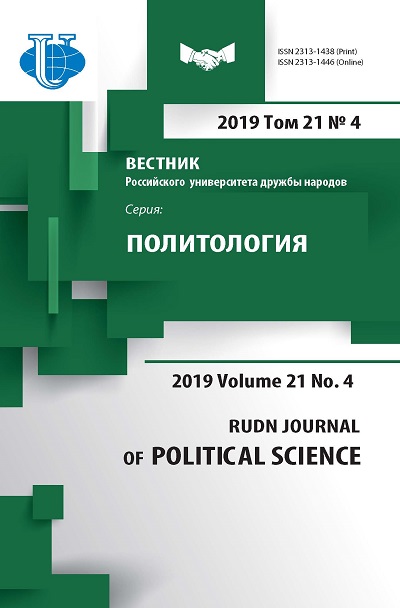Institutional Foundations of Intraparty Coalitions in Presidential Systems: Case of Uruguay
- Authors: Varshavsky A.Y.1
-
Affiliations:
- Moscow State Institute of International Relations (MGIMO University) under the Ministry of Foreign Affairs of the Russian Federation
- Issue: Vol 21, No 4 (2019)
- Pages: 673-686
- Section: POLITICAL PROCESSES IN CONTEMPORARY WORLD
- URL: https://journals.rudn.ru/political-science/article/view/22626
- DOI: https://doi.org/10.22363/2313-1438-2019-21-4-673-686
Cite item
Full Text
Abstract
The article analyzes the institutional foundations of the emergence and functioning of the major party factions in Uruguay and their influence on maintaining the stability of the presidential regime. The Uruguayan parties are historically characterized by fragmentation and consist of many ideologically diverse movements, which allows us to view them as coalitions. The factions competing among themselves for the influence on the political agenda ultimately form the party’s common strategy. Coalition tendency within parties is largely determined by the peculiarities of the electoral system established in Uruguay. The elected president with a broad mandate, being a representative of his faction, must build coalition relations with other factions of his party, giving them various concessions in the executive branch. Based on the factors considered, the author concludes that the electoral characteristics of the Uruguayan political system create the necessity for coalitions among party factions, thus affecting the stability of presidential rule.
About the authors
Arseny Y. Varshavsky
Moscow State Institute of International Relations (MGIMO University) under the Ministry of Foreign Affairs of the Russian Federation
Author for correspondence.
Email: arsenyvarshavsky@gmail.com
PhD candidate of Comparative Politics Department, MGIMO University, Attaché at the Russian Embassy in Nicaragua
76, Vernadskogo Av., Moscow, Russian Federation, 119454References
- Linz J.J. Presidential or Parliamentary Democracy: Does it Make a Difference? New Haven: Yale University Press; 1985. 19 p.
- Linz J.J., Stepan A. Problems of Democratic Transition and Consolidation: Southern Europe, South America, and Post-Communist Europe. Baltimore: Johns Hopkins; 1994. 504 p.
- Shugart M.S., Carey J. Presidents and Assemblies: Constitutional Design and Electoral Dynamics. Cambridge: Cambridge University Press; 1992. 332 p.
- Mainwaring S. Presidentialism, Multipartism, and Democracy: The Difficult Combination. Comparative Political Studies. 1993; 26 (2): 198-228.
- Mainwaring S. Presidentialism in Latin America. Latin American Research Review. 1990; 25: 157-179.
- Cheibub J.A., Przeworski A., Saiegh S.M. Government Coalitions and Legislative Success under Presidentialism and Parliamentarism. British Journal of Political Science. 2004; 34: 565-587.
- Kharitonova O.G. Presidency and Democracy: State of the Debate. Politicheskaya nauka. 2012; 3: 199-213 (In Russ.).
- Mainwaring S., Scully T.R. Building Democratic Institutions: Party Systems in Latin America. Stanford: Stanford University Press; 1995. 600 p.
- Peeler J. Building Democracy in Latin America. Boulder: Lynne Rienner; 2008. 275 p.
- Lijphart A. Patterns of Democracy: Government Forms and Performance in Thirty-Six Countries. New Haven: Yale University Press; 1999. 348 p.
- Buchanan P. State, Labor, Capital: Democratizing Class Relations in the Southern Cone. Pittsburgh: University of Pittsburgh Press; 1995. 395 p.
- Resultados por fórmula presidencial (1971-2009). Facultad de Ciencias Políticas de la Universidad de la República. Available from: http://cienciassociales.edu.uy/bancosdedatos/ elecciones-presidenciales-2/. Accessed: 14.09.2019 (In Span.).
- Cason J. Electoral Reform, Institutional Change, and Party Adaptation in Uruguay. Latin American Politics and Society. 2002; 44 (3): 89-109.
- Panizza F., Ramos Larraburu C., Shrelis G. Unpacking Patronage: The Politics in Patronage Appointments in Argentina’s and Uruguay’s Central Public Administrations. The Journal of Politics in Latin America. 2018; 10 (3): 59-98.
- Bergara M., Pereyra A., Tansini R., Garce A., Chasquetti D., Buquet D., Moraes J.A. Political Institutions, Policymaking Processes, and Policy Outcomes: The Case of Uruguay. IDB Working Paper. 2006; 205: 1-66. Available from: https://papers.ssrn.com/sol3/ papers.cfm?abstract_id=1814759. Accessed: 29.08.2019.
- Sartori G. Parties and Party Systems: A Framework for Analysis. Cambridge: Cambridge University Press; 1976. 368 p.
- Solari A. Uruguay: Partidos Políticos y Sistema Electoral. Montevideo: Fundación de Cultura; 1991. 253 p. (In Span.).
- Gonzalez L.E. Political Structures and Democracy in Uruguay. Notre Dame, IN: Notre Dame University Press; 1991. 201 p.
- Moraes J.A. Why Factions: Candidate Selection and Legislative Politics in Uruguay. Pathways to Power: Political Recruitment and Candidate Selection in Latin America. Ed. by P. Siavelis, S. Morgenstern. Philadelphia, PA: Penn State University Press; 2008. 496 p.
- Duverger M. Political Parties. Moscow: Akademicheskiy proekt; 2018. 544 p. (In Russ.).
- Morgenstern S. Organized Factions and Disorganized Parties: Electoral Incentives in Uruguay. Party Politics. 2001; 7 (2): 235-256.
- Correa Freitas R., Vázquez C. La reforma constitucional de 1997: análisis constitucional y administrativo. Montevideo: Fundación de Cultura Universitaria, 1997 (In Span.).
- Semino M. Panorama del nuevo sistema electoral. Reflexiones sobre la reforma constitucional de 1996. Mata Prates C. (ed.). Montevideo: Fundación de Cultura Universitaria; 1998. 150 p. (In Span.).
- Elecciones Nacionales 2014. Corte Electoral de la República Oriental del Uruguay. Available from: https://www.corteelectoral.gub.uy/estadisticas/nacionales/elecciones_nacionales2014. Accessed: 14.09.2019. (In Span.).
- Magar E., Moraes J.A. Of Coalition and Speed: Passage and Duration of Statutes in Uruguay's Parliament, 1985-2000. IBEI Working Papers. 2008: 1-33.
- Magar E., Moraes J.A. Factions with Clout: Presidential Cabinet Coalition and Policy in the Uruguayan Parliament. Party Politics. 2009; 18 (3): 427-451.
- Buquet D., Chasquetti D., Moraes J.A. Fragmentación política y gobierno en Uruguay: ¿un enfermo imagnario? Montevideo: Instituto de Ciencia Política, Facultad de Ciencias Sociales, 1998. 130 p. (In Span.).
- Constitución de la República. Parlamento del Uruguay. Available from: https://parlamento.gub.uy/documentosyleyes/constitucion. Accessed: 15.09.2019. (In Span.).
- Zucco Jr.C. Legislative Coalitions in Presidential Systems: The Case of Uruguay. Latin American Politics and Society. 2013; 55 (1): 96-118.
- Milanesi A. Desarrollo Institucional y Caracterización del Centro de Gobierno en Uruguay. Revista Uruguaya de Ciencia Política. 2017; 26 (2): 103-125 (In Span.).
- Chasquetti D. Compartiendo el Gobierno: Multipartidismo y Coaliciones en el Uruguay (1971-1997). Revista Uruguaya de Ciencia Política. 1999; 10 (1): 25-45 (In Span.).
- Altman D. The Politics of Coalition Formation and Survival in Multi-Party Presidential Democracies: The Case of Uruguay, 1989-1999. Party Politics. 2000; 6; 3: 259-283.
















